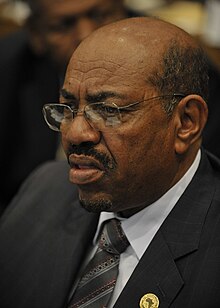Omar al Bashir
|
Colonel Omar al-Bashir عمر البشير |
|
|---|---|
 |
|
| 7th President of Sudan | |
|
Assumed office 30 June 1989 |
|
| Prime Minister | Bakri Hassan Saleh |
| Vice President |
Zubair Mohamed Salih Ali Osman Taha John Garang Salva Kiir Mayardit Ali Osman Taha Alhaj Adam Yousef Bakri Hassan Saleh |
| Preceded by | Ahmed al-Mirghani |
| Chairman of the Revolutionary Command Council for National Salvation | |
|
In office 30 June 1989 – 16 October 1993 |
|
| Succeeded by | Himself as President |
| Personal details | |
| Born |
Omar Hassan Ahmad al-Bashir 1 January 1944 Hosh Bannaga, Sudan |
| Political party | National Congress |
| Spouse(s) | Fatima Khalid Widad Babiker Omer |
| Alma mater | Egyptian Military Academy |
| Military service | |
| Allegiance |
|
| Service/branch |
|
| Years of service | 1960–present |
| Rank | Field Marshal |
| Battles/wars |
First Sudanese Civil War Yom Kippur War Second Sudanese Civil War |
Omar Hassan Ahmad al-Bashir (Arabic: عمر حسن أحمد البشير; pronunciation: [ba'ʃiːr]; born 1 January 1944) is a Sudanese politician, the seventh president of Sudan and head of the National Congress Party. He came to power in 1989 when, as a brigadier in the Sudanese Army, he led a group of officers in a military coup that ousted the democratically elected government of prime minister Sadiq al-Mahdi after it began negotiations with rebels in the south. Since then, he has been elected three times as President in elections that have been under scrutiny for corruption. In March 2009, al-Bashir became the first sitting president to be indicted by the International Criminal Court (ICC), for allegedly directing a campaign of mass killing, rape, and pillage against civilians in Darfur.
In October 2005, al-Bashir's government negotiated an end to the Second Sudanese civil war, leading to a referendum in the South, resulting in the separation of the south into the separate country of South Sudan. In the Darfur region, he oversaw the war in Darfur that has resulted in death tolls that are about 10,000 according to the Sudanese Government, but most sources suggest between 200,000 and 400,000. During his presidency, there have been several violent struggles between the Janjaweed militia and rebel groups such as the Sudanese Liberation Army (SLA) and the Justice and Equality Movement (JEM) in the form of guerrilla warfare in the Darfur region. The civil war has displaced over 2.5 million people out of a total population of 6.2 million in Darfur and has created a crisis in the diplomatic relations between Sudan and Chad. The rebels in Darfur lost the support from Libya after the death of Muammar Gaddafi and the collapse of his regime in 2011.
...
Wikipedia
